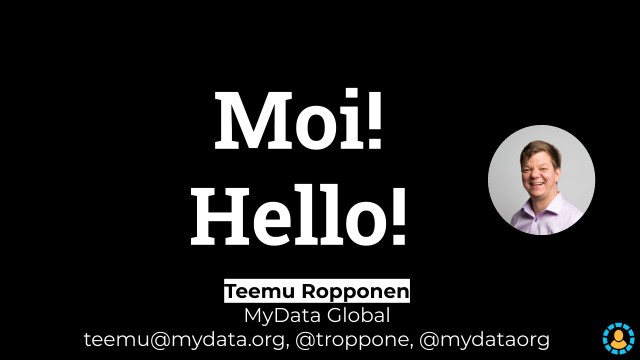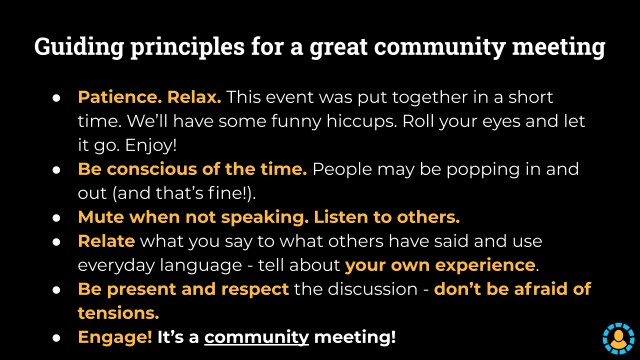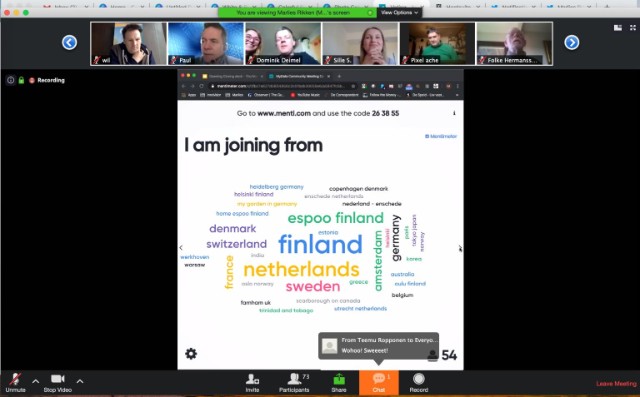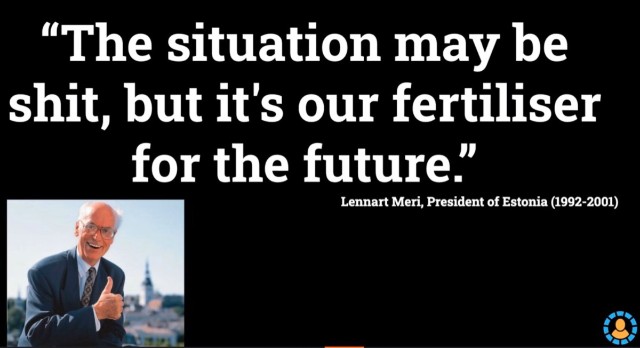“12.27, Thursday, March 19th. After a week of uncertainty, discussions and improvisation, the preparation team was ready. The scenario was discussed, Zoom was running. A last moment of silence for Marlies, Viivi, Karolina, Teemu and Wil. You could almost feel the tension through the internet. “There are already 17 people in the waiting room!” said Viivi. It was time to get started. With “Moi kaikki ” Teemu opened the first fully digital community meeting. A few minutes later, more than 90 people were virtually attending, from all over the world. More than we could ever have gathered in Amsterdam…"
The MyData spring meeting
The purpose of MyData Global is to empower individuals by improving their right to self-determination regarding their personal data. It is based on the MyData Declaration. MyData Global has nearly 90 organisation members and over 600 individual members from over 40 countries, on six continents. Twice a year, the MyData Global organisation meets, somewhere in the world. In April 2019 it was decided to organise the spring meeting in Amsterdam, facilitated by the InnoValor and the Dutch MyData Hub. Preparations began, rooms were booked, catering selected and sponsorship was found. Webinars, workshops, pitches, networking and open space, all this during the three day event and all this in MyData spirit of sharing, learning and inspiring each other.

Due to the travel and meeting restrictions caused by Covid-19, we were not able to meet face-to-face in Amsterdam. The plans had to change but we did not give up! On very short notice, we decided to channel our efforts into creating an online alternative, to what would have been a three day offline conference. We learned a lot about online conferencing along the way and we would like to share what we learned. In the hopes of inspiring others by showing that online alternatives are possible and that great results can still be achieved by coming together in a digital way!
Seven lessons for a great online conference
There are a few lessons we learned that can help anybody in creating a great meeting. Those are not (only) about technology. Of course technology is important, there are many great solutions in place. In this case we used Zoom, as that is the MyData infrastructure, plus Slack for preparatory discussion and Google document editing. The real lessons however, are in different areas.
1. Combine channels in your preparation
One you get disconnected physically, you need to reconnect digitally, also in the preparation. This holds for the team, as well as for connecting to the audience. We used both synchronous as well as asynchronous channels to communicate internally as well as externally. MyData.org and its community site on Slack were used extensively to keep everybody informed on the program, the changes, and the uncertainties. Transparency and consistency over all channels is essential.
2. Create a detailed scenario
Make sure everyone that is involved in hosting and presenting the conference is on the same page. Some are similar to a normal conference: Who is the main host? Are all the speakers clear and are they informed? When will people get a chance to ask questions? Other roles are specific for an online conference, these too need to be defined properly in advance: someone to share their screen to show the slide deck, a main technology operator, and a dedicated moderator for the online chat, that for example gathers questions.

3. Create clear rules
Online meetings come with their own rules and people still have to get used to them in this new way of conferencing. Make them explicit. Share them. Discuss them. Online conferences require even more discipline than their physical counterparts. These are the rules and guidelines we used during the sping meeting.
4. Find opportunities for interaction
Online meetings are intense in large audiences. It is hard to keep people involved. Create breakout possibilities in the conference, for example by working together on online documents, even in seperate groups (Zoom has great functionality to put people in smaller groups and bring them together after a while). In addition, make sure to include moments where attendees can give their input. Ask a specific question and give them a chance to speak. And use online questionaire tools such as Mentimeter where fitting.
5. Moderating is vital
In online meetings, moderating is at least a double role. Somebody has to chair the session and somebody else needs to moderate chat and questions and pass them on. Questions should be asked primarily textually during talks and can be gathered. Sometimes the audience can help eachother and will answer the question before it is brought to a plenary level. The moderator can choose what is important to share with everyone.

6. Make sure there are plenty of short breaks!
Keeping people’s attention is always a challenge. Even more so when they are working from home, logged in on their own PC and possibilities for interaction are limited. You cannot catch their eye directly and there may be all sorts of things going on in their surroundings. Maybe children need attention or a cat is jumping on their desk… Give people a chance to take care of themselves and other tasks by scheduling plenty of short breaks in your online conference.
7. Use humour
Even though you have made the best preparations possible some things will probably go wrong, so you might as well stop worrying about it! People will be muted accidentally or the next presenter might not be familiar with using your type of tech and messes it up. Positivity and a joke here and there go a long way in helping people get comfortable. Just remind everyone that we are all learning to work in a new way and you are doing your best to accommodate! Don’t take it too seriously!
On the bright side
These are complex times with lots of uncertainty. Society is disrupted in a way we seldom have encountered, fortunately. Very little reason for joy for most people. But our experience shows that modern technology combined with human flexibilty can lead to great events. Events that might even work more effectively than live events…
We missed the hugs, the beers, the get-togethers, and boat trips we would have had in Amsterdam. Those are hard to replace. But we came close, quite close.

